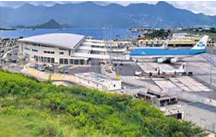|
From:TheBahamasWeekly.com Caribbean News
SIMPSON BAY, St. Maarten - PJIAE met on January 5 with Sol and Chevron as well as other stakeholders to discuss the current shortage of aviation fuel experienced in St. Maarten. Several measures are being taken to mitigate the current effects and better secure PJIA’s operations in the future. Among these measures is a planned relocation of the fuel farm at PJIA, which will commence during the second quarter of this year, while a Service Level Agreement that includes performance standards will be put in place with all PJIA suppliers, including those who supply aviation fuel. Moving PJIA’s fuel farm to an offsite location will result in increased storage capacity for fuel and will also free up valuable ramp space. Similarly, Sol has filed the required documents with the respective government authorities to enable it to commence construction of an additional storage tank that would double its storage capacity to a combined 25,000 barrels. Storage is indeed a major factor in the current fuel shortage. Once approval is received, the construction of the new tank is expected to take some six months. This means, before this year ends, the situation at PJIA with regards to aviation fuel would have improved dramatically.
In
the meantime, Sol expects relief
One short-term solution being considered by Sol is to switch from Jet A1 fuel to Jet A specification fuel, which can be sourced more readily at other suppliers. This specification change would allow Sol to purchase fuel from additional suppliers rather than being limited to its main supplier of Jet A1 fuel, Petrotrin of Trinidad and Tobago. The primary difference between Jet A specification and Jet A1 is the freezing point, which Sol confirmed will not affect its clients. Although last week’s tanker brought Jet A1 fuel from Curacao, Niles noted, however, that Curacao is not as dependable a source for this type of fuel as Trinidad and Tobago. The Sol general manager further explained why his company has not considered acquiring fuel from the US or Venezuela, given the acute shortage it is facing. While immediately available, it was noted that deliveries from the US would take longer than direct deliveries from Trinidad and Tobago or Curacao due to “transit times” and “tanker size.” Niles noted that Venezuela does not produce Jet A1 fuel. Niles confirmed that Sol is in direct contact with the head offices of the various airlines that service PJIA to update them on the daily fuel allotments for their aircrafts. However, Sol will also now provide daily communiqués to PJIA and St. Maarten handlers for both commercial airlines and General Aviation (GA). “We are doing our best to manage the situation,” said Andrew Niles, adding: “We could only operate with what we have.” The General Aviation (GA) sector is the most hit by the current fuel shortage. Sol noted it is easier to manage commercial carriers as their schedules and requirements are fixed, whereas with General Aviation this is not the case. However, the pending deliveries and recertification of the fuel should alleviate some of the restrictions and result in possible relaxation this week. “The GA fuel situation is a bit more complicated,” admitted Niles, “as some use brokers for their fuel purchases. Additionally, unlike Commercial flights, we do not have a clear picture of the fuel requirements for GA, as they operate and require fuel on ‘as needed’ basis.” Following Thursday’s meeting, however, Sol agreed to look into further “relaxing” the current restrictions, especially on General Aviation. Commercial Aviation has already been moved up from 50% to 75%. Nevertheless, the fuel rationing for General Aviation may continue a little longer. Commenting on the matter, PJIA managing director, Regina LaBega said, “the situation is really unfortunate, but it has our undivided attention.” “We are working with our stakeholders, to share strategies that would enable us to spot potential problems in time so that we can respond in an effective, dynamic and informed manner,” LaBega said. “The idea is to find permanent solutions for this issue.”
|
